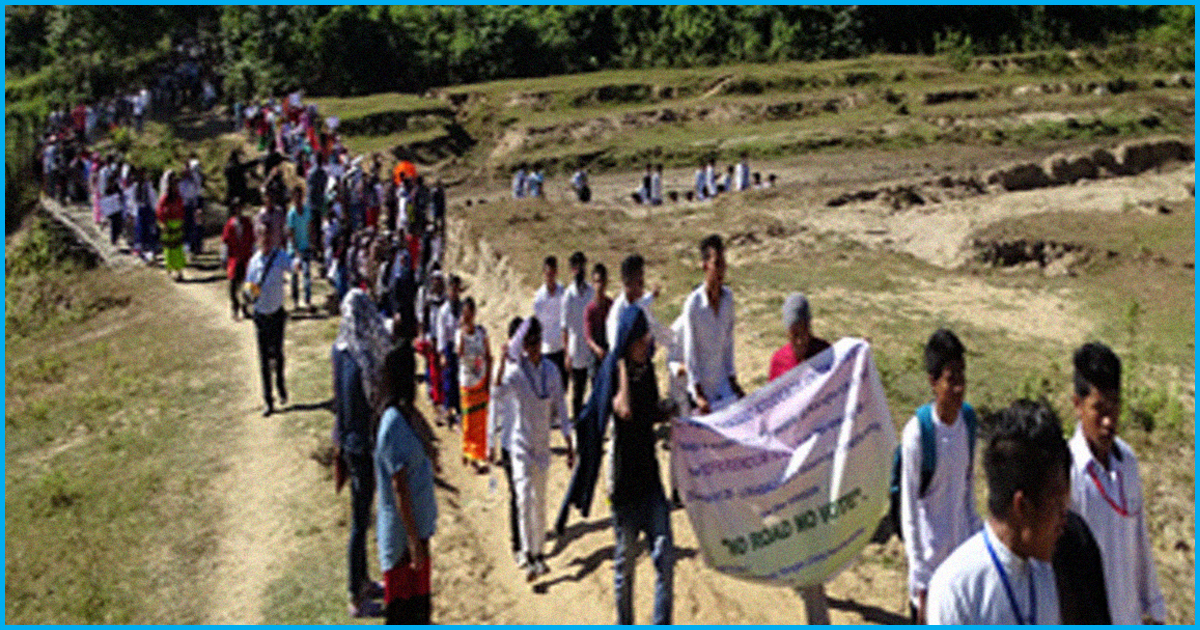Arunachal Pradesh has been a topic of discussion for failing to extend road connectivity to many parts of the state. Despite the Kangku circle in the Lower Siang district of Arunachal Pradesh being just 15 km away from Assam’s NH15 and 65 km away from Likabali, the headquarters of the district, the 24 remote villages being connected under the circle has only remained a dream for the people.
After several demands of the villagers being ignored by those in power, they decided to resort to ‘no road, no vote” policy. They simply withheld participation in the process that would place anyone in the position of power.
Now, after the ‘no road, no vote’ campaign continued over a year, the movement has finally borne fruit. A 65-km road has finally been sanctioned by the state’s rural works department under the Pradhan Mantri Gram Sadak Yojana, and the work is expected to be completed soon, said a report by The Times of India.
“A dream come true”
“This is a dream come true for us. We have suffered a lot because of the lack of connectivity. Things get worse when there is a medical emergency or inter-state disputes break out,” said Mikjom Taso coordinator of the “No Road No Vote” Central Committee that led the movement.
In 2017, before the by-election for the Likabali assembly seat, the campaign had taken off. Under the circle, five of the nine polling stations remained empty, and nobody turned up to vote. Educated elders, local youth, as well as members of the welfare societies of each and every village, decided to carry out the ‘no road, no vote’ movement.
Taso said that they held a public rally on November 18, 2017, “to send out the message to the political parties that we will not accept the status quo anymore,” as reported by The Wire.
What inspired and motivated the villagers to carry out a ‘no road, no vote’ movement was the success of Sissen, a small village in the Upper Siang district. They believed that if a small village like Sissen could get a concrete road made by resorting to a ‘no road, no vote’ movement, so can they.
Difficulties the villagers have been facing
Despite so many governments coming and going since independence, nobody made an effort to build a concrete road link to the headquarters. Mostly comprising of Galo and Nishi tribes, the villagers have to use the National Highway 51, which is 12 to 15 km away, to reach Silapathar and then travel 7 km more to Likabali. Students have to go to Likabali for education and hence had no option but to make use of the Silapathar route.
According to the villagers, they often have to carry ailing persons on their back to reach Silapathar for treatment. During the six months of monsoon, even a nullah (small drain) between two villages turns into a small river. So the communication gets further restricted without the presence of an all-weather road,” related Dajo Ngomle, who is a resident of Bali Soli village of the administrative circle.
Further, since there is no road, no government officials visit the villagers.
Alleged attempt to break the movement
Villagers Taso and Ngomle had to say that huge sums of money had been given to the villagers so they would quit the movement and vote instead. Due to some villagers quitting the movement, four out of nine polling booths saw voters driven there. “I don’t blame the people. They are poor; not every day do they see ten or fifteen thousand rupees at one go,” said Ngomle.
Although there were rumours that political parties had given money to the central committee members, Taso said that they stood united and ensured that the movement was carried out successfully.
“Our movement will continue”
On October 21, local media got to know from Likabali MLA Kardo Nyigyor that for the who whole constituency, 16 road construction projects worth Rs 155 crore has been sanctioned under the Pradhan Mantri Gram Sadak Yojana. Projects have finally been cleared under Kangku, Gensi, Siji, Likabali and other circles as well.
After the villagers got to know about the media reports, they approached the authorities and the authorities confirmed it to them. However, the technical clearance is awaited. “The assembly and parliamentary elections are a few months away. So till tenders are formally called and the work is completed, our movement will continue,” said Taso.
The ‘no road, no vote’ movement, setting an example of unity between the villagers, is not the only one of its kind but has inspired another district called Upper Subansiri. In January this year, they took out a rally to protest against the awful condition of the highway between the same district’s Daporijo town to Upper Siang district’s Ziro town. Until the government does something to fulfil their demands, they have decided not to take part in any election.
The Logical Indian appreciates the villagers of Arunachal Pradesh for taking part in a movement that ensured that politicians fulfil the bsaic demands of the people, and for showing a way to other villages that protests can bore sweet fruit.
Also Read: Army Acquired Their Land In 1962, Arunachal Villagers Get 38 Crore Compensation After 56 Years











